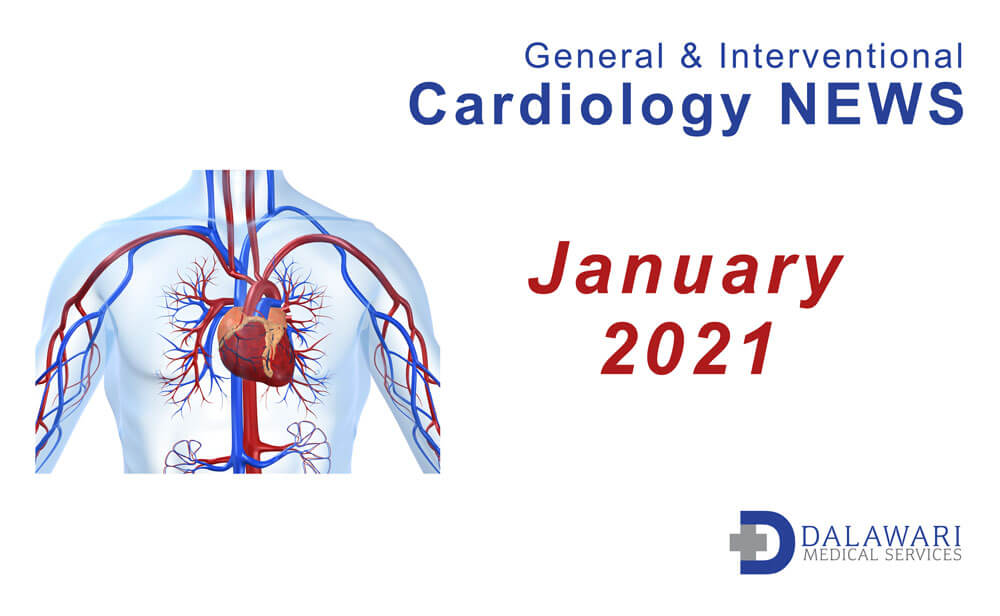Cardiology News: January 2021
DMS Cardiology news is a curated collection of interesting articles, posts & studies related to general & interventional cardiology, cardiovascular & heart health that may be of help or interest to others. All articles are sourced from reliable and respected sources cited with links to read the original full article.
DISCLAIMER: Dr. Dalawari shares interesting and relevant medical news and articles in the press. He has no professional or personal relationship to sources other than in some cases as a member of the organization.
Heart Transplant 'Liquid Biopsy'; PCSK9 CRISPR; More SGLT2 Drugs Try FDA in HF
Jan 19, 2021 - MedPageToday
Unusual Case of Cardiac Arrest
Jan 19, 2021 - JAMA Network
A patient in their 40s with a history of remote coronary artery bypass grafting, heart failure with reduced ejection fraction, and poorly controlled insulin-dependent diabetes was admitted to the cardiac intensive care unit with acute decompensated heart failure.
The patient’s baseline electrocardiogram (ECG) demonstrated normal sinus rhythm, with normal PR and QRS intervals at 132 and 82 milliseconds, respectively. With poor response to intravenous (IV) diuretics, the patient underwent right heart cardiac catheterization, which demonstrated a low cardiac index, high left ventricular filling pressure, and elevated systemic vascular resistance.
The patient’s outpatient use of metoprolol was discontinued, and IV dobutamine (5.0 µg/kg/min) was initiated with continuing aggressive IV diuresis...
New Training Statement Defines Core Competencies For Vascular Medicine Specialists
Jan 15, 2021 - American College of Cardiology
At a glance:
Does the Ketogenic Diet Benefit Patients With Heart Failure?
Jan 13, 2021 -
At a glance:
Ketones and the Failing Heart
CMS unleashes innovation to ensure our nation’s seniors have access to the latest advancements
At a glance:
Today’s action represents a step forward that will help smooth the Medicare coverage pathway for innovative products, resulting in faster access to new devices for America’s seniors. This action delivers on CMS’s Unleashing Innovation and Patients Over Paperwork Initiative.
Under current rules, FDA approval of a device is followed by an often lengthy and costly process for Medicare coverage. The lag time between the two results in innovators first spending time and resources on FDA approval, and then subsequently on the Medicare coverage process. This causes an undue burden for innovators and could delay access to these potentially life-saving technologies during the existing Medicare coverage determination process.
Impact of COVID-19 on Diagnosis of Heart Disease Worldwide
At a glance:
-
COVID-19 pandemic was associated with a rapid reduction in cardiovascular diagnostic procedures across the world.
-
Additional studies are indicated to assess the impact of these reductions in cardiovascular diagnostic care related to COVID-19, as they raise serious concerns for long-term worsening of cardiovascular health outcomes from lack of timely diagnosis.
-
Multiple stakeholders will need to work together to improve timely patient access to cardiovascular diagnosis and therapeutics in this ongoing and in future pandemics.
Study Questions:
Conclusions:
Effect of Machine Learning on Dispatcher Recognition of Out-of-Hospital Cardiac Arrest During Calls to Emergency Medical Services
At a glance:
Do you have questions about a medical case or need help understanding treatment plans and options?
Health & Patient Advocacy | Medical Case Review
Medical Expert Witness
Dalawari Medical Services - Medical Consulting
Click here to Contact Us via email or Call + (804)-991-4109




